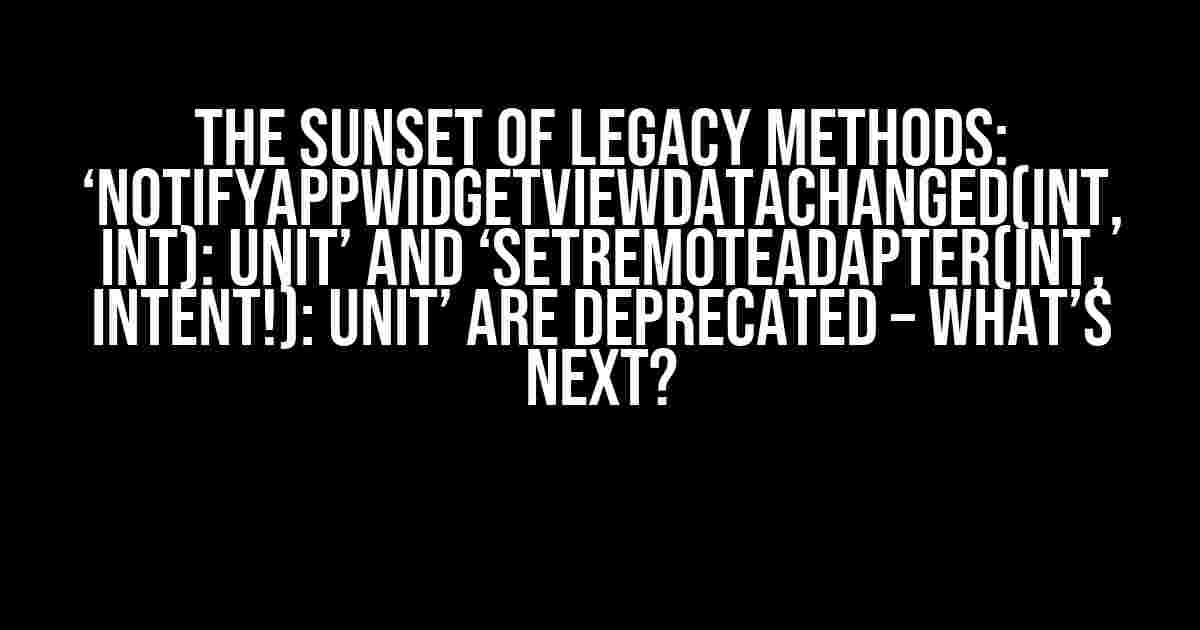As Android developers, we’re no strangers to the ever-changing landscape of APIs and methods. With the release of newer Android versions, some older methods become outdated, and it’s time to bid them adieu. In this article, we’ll dive into the deprecation of two commonly used methods: ‘notifyAppWidgetViewDataChanged(Int, Int): Unit’ and ‘setRemoteAdapter(Int, Intent!): Unit’. We’ll explore what this means for your app, how to adapt, and what the future holds.
What do these methods do, anyway?
Before we dive into the deprecation, let’s quickly review what these methods are used for:
‘notifyAppWidgetViewDataChanged(Int, Int): Unit’
This method is part of the AppWidget framework, which allows developers to create interactive widgets on the home screen. ‘notifyAppWidgetViewDataChanged(Int, Int): Unit’ notifies the AppWidget manager that the data associated with a particular widget has changed, so it should be updated. This is typically used when the underlying data powering the widget is updated, such as when a user adds a new item to a list.
‘setRemoteAdapter(Int, Intent!): Unit’
This method is also part of the AppWidget framework and is used to set the remote adapter for a widget. The remote adapter is responsible for providing the data that populates the widget. By calling ‘setRemoteAdapter(Int, Intent!): Unit’, you’re telling the widget to use a specific adapter to fetch and display data.
Why have these methods been deprecated?
The main reason for deprecating these methods is to encourage developers to adopt more modern and efficient approaches to building AppWidgets. With the introduction of newer Android versions, the AppWidget framework has undergone significant changes to improve performance, security, and overall user experience.
In particular, the newer Android versions (starting from Android 12) have introduced the ‘AppWidgetManager.updateAppWidget()’ method, which provides a more streamlined and efficient way to update widgets. This method eliminates the need for ‘notifyAppWidgetViewDataChanged(Int, Int): Unit’ and ‘setRemoteAdapter(Int, Intent!): Unit’, making the code more concise and easier to maintain.
What does this mean for my app?
If you’re currently using ‘notifyAppWidgetViewDataChanged(Int, Int): Unit’ or ‘setRemoteAdapter(Int, Intent!): Unit’ in your app, you might be wondering what this means for your existing code. The good news is that these methods are not being removed immediately, but they will be eventually. To avoid potential issues and ensure compatibility with future Android versions, it’s recommended to start migrating your code to the newer ‘AppWidgetManager.updateAppWidget()’ method.
Migrating to the new method
Migrating to the ‘AppWidgetManager.updateAppWidget()’ method is relatively straightforward. Here’s a step-by-step guide to help you get started:
Step 1: Update your dependencies
Make sure you’re using the latest version of the Android SDK and AppWidget framework. Update your build.gradle file to include the necessary dependencies:
dependencies {
implementation 'androidx.appcompat:appcompat:1.3.1'
implementation 'androidx.core:core-ktx:1.6.0'
implementation 'androidx.appwidget:appwidget:1.3.0'
}
Step 2: Create an instance of AppWidgetManager
Create an instance of the AppWidgetManager class, which will be used to update the widget:
val appWidgetManager = AppWidgetManager.getInstance(context)
Step 3: Update the widget using AppWidgetManager.updateAppWidget()
Instead of calling ‘notifyAppWidgetViewDataChanged(Int, Int): Unit’, use the ‘AppWidgetManager.updateAppWidget()’ method to update the widget:
appWidgetManager.updateAppWidget(appWidgetId, RemoteViews(
context.packageName,
R.layout.app_widget
).apply {
// Update the widget's remote views here
})
Step 4: Set the remote adapter (optional)
If you need to set a remote adapter for your widget, you can do so using the ‘AppWidgetManager.updateAppWidget()’ method. Create an instance of the remote adapter and pass it to the method:
val remoteAdapter = MyRemoteAdapter()
appWidgetManager.updateAppWidget(appWidgetId, RemoteViews(
context.packageName,
R.layout.app_widget
).apply {
setRemoteAdapter(R.id.widget_list, Intent(context, MyRemoteService::class.java))
// Update the widget's remote views here
})
Common pitfalls and solutions
When migrating to the new method, you might encounter some common issues. Here are some solutions to help you overcome them:
Pitfall 1: AppWidgetManager.updateAppWidget() crashes the app
If your app crashes when calling ‘AppWidgetManager.updateAppWidget()’, it’s likely due to a null pointer exception. Make sure you’re passing the correct app widget ID and that the remote views are properly initialized.
Pitfall 2: Widget not updating despite calling AppWidgetManager.updateAppWidget()
If the widget doesn’t update despite calling ‘AppWidgetManager.updateAppWidget()’, check that you’re calling the method on the UI thread. You can use ‘Activity.runOnUiThread()’ or a coroutine to ensure the method is called on the UI thread.
Conclusion
The deprecation of ‘notifyAppWidgetViewDataChanged(Int, Int): Unit’ and ‘setRemoteAdapter(Int, Intent!): Unit’ is a natural step forward in the evolution of the AppWidget framework. By migrating to the newer ‘AppWidgetManager.updateAppWidget()’ method, you can ensure your app remains compatible with future Android versions and takes advantage of the latest performance and security enhancements.
Remember, it’s essential to stay up-to-date with the latest developments in the Android ecosystem to provide the best possible experience for your users. Take the time to review and adapt your code, and get ready to take your app to the next level!
| Method | Deprecated | Replacement |
|---|---|---|
| ‘notifyAppWidgetViewDataChanged(Int, Int): Unit’ | Yes | ‘AppWidgetManager.updateAppWidget()’ |
| ‘setRemoteAdapter(Int, Intent!): Unit’ | Yes | ‘AppWidgetManager.updateAppWidget() with remote adapter} |
Key Takeaways:
- ‘notifyAppWidgetViewDataChanged(Int, Int): Unit’ and ‘setRemoteAdapter(Int, Intent!): Unit’ are deprecated.
- Use ‘AppWidgetManager.updateAppWidget()’ to update widgets and set remote adapters.
- Migrate your code to ensure compatibility with future Android versions.
- Review and adapt your code to take advantage of the latest performance and security enhancements.
Further Reading:
- AppWidgetManager | Android Developers
- App Widgets | Android Developers
- The Sunset of Legacy Methods in Android 12 | by Android Developers | Medium
Get ready to level up your Android development skills! Explore more tutorials, guides, and resources on our blog:
Stay ahead of the curve and get notified about the latest Android developments, tutorials, and resources:
Frequently Asked Question
Are you tired of seeing those pesky deprecation warnings in your Android app? We’ve got you covered! Here are the answers to your burning questions about the dreaded “'notifyAppWidgetViewDataChanged(Int, Int): Unit' and 'setRemoteAdapter(Int, Intent!): Unit' are deprecated” errors.
What’s going on? Why are these methods deprecated?
Google has deprecated these methods in API level 29 (Android 10) to improve security and performance. The new way of updating AppWidget views and setting remote adapters is more efficient and secure, but it does require some changes to your code.
What’s the alternative to notifyAppWidgetViewDataChanged(Int, Int): Unit?
You should use the AppWidgetManager.updateAppWidget() method to update your AppWidget views. This method allows you to update the views of multiple AppWidgets at once, making it more efficient than the deprecated method.
How do I set a remote adapter for my AppWidget now?
You can use the setRemoteAdapter(Int, Intent!) method on the AppWidgetOptions object, which you can get from the AppWidgetManager.getInstance().getAppWidgetOptions() method. This new method is more secure and efficient than the deprecated one.
Do I need to update my Android app’s target SDK version to use these new methods?
Yes, you need to update your app’s target SDK version to at least API level 29 (Android 10) to use the new methods. However, you can still support older Android versions by using the deprecated methods and checking the Android version at runtime.
Will my app still work if I don’t update these deprecated methods?
Yes, your app will still work, but it’s not recommended to ignore these deprecation warnings. The deprecated methods may be removed in future Android versions, and your app may stop working or behave unexpectedly. It’s always a good idea to update your code to use the latest and greatest APIs.


